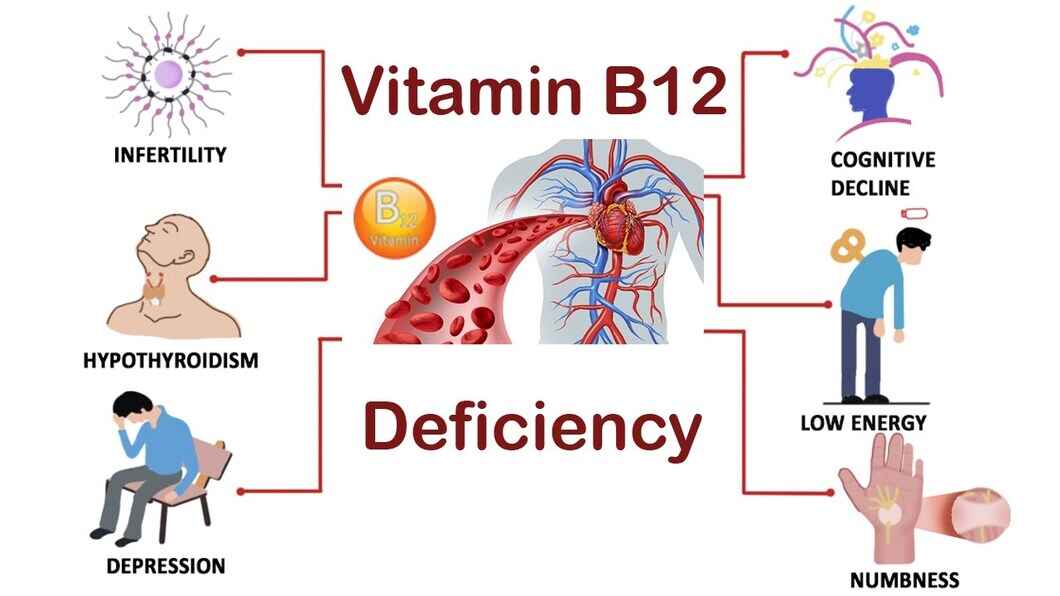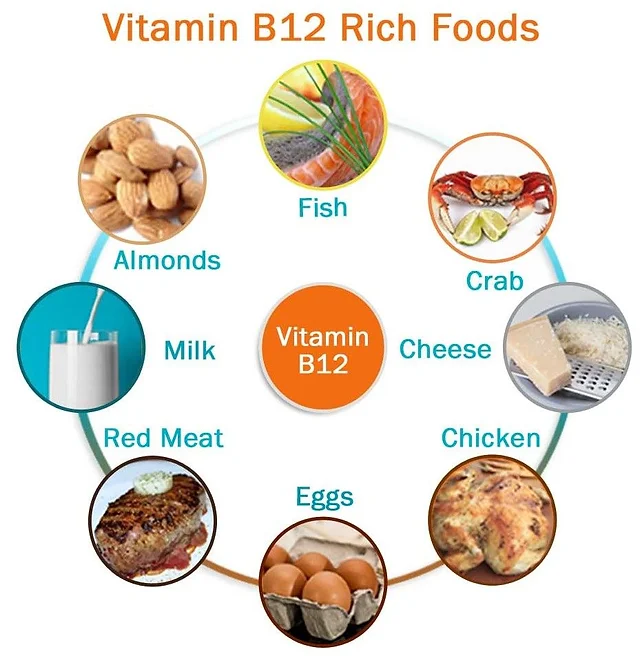/mothersopedia/media/media_files/JpHcefUz79oBjIjV43VP.jpeg)
Vitamin B12, also known as cobalamin, is an essential nutrient that plays a pivotal role in maintaining overall health and well-being. It is a water-soluble vitamin that cannot be produced by the human body and must be obtained through dietary sources or supplements.
In this article, we will explore the importance of vitamin B12 and discuss the symptoms of vitamin B12 deficiency, a condition that can have serious implications if left untreated.
The Role of Vitamin B12: Here are some key roles of vitamin B12:
Red Blood Cell Production: Vitamin B12 is essential for the synthesis of red blood cells. It plays a crucial role in the production of DNA, RNA, and hemoglobin, the protein responsible for carrying oxygen throughout the body.
Nervous System Health: Vitamin B12 is involved in maintaining the health of the nervous system. It helps in the formation of myelin, a protective shield that covers nerve fibers, promoting healthy nerve signaling and function.
Energy Production: Vitamin B12 is necessary for the metabolism of carbohydrates, proteins, and fats, thus converting food into energy, which is fuel for our body to work.
DNA Synthesis: Vitamin B12 is involved in the synthesis and repair of DNA, the genetic material present in every cell. It has an important part to play in cell division and growth.
You may develop a vitamin B12 deficiency if your body doesn’t produce enough or if you don’t eat enough vitamin B12-rich foods
Vitamin B12 deficiency can also cause symptoms that affect your brain and nervous system (neurological symptoms), including:

- Numbness and low-energy
- Muscle weakness, Brittle bones
- Psychological problems, which can range from mild depression or anxiety to confusion and dementia, and memory loss
- Problems with balance and coordination.
- Pins and needles sensations
- Vision problems.
- Digestive Issues such as constipation, loss of appetite, or weight loss.
- Pale or Yellowish Skin
Serious Health Issues Caused by Vitamin B12 Deficiency
Vitamin B12 deficiency can cause multiple complications in the body. However, the severity can vary from person to person.
- Neurological complications: Insufficient vitamin B12 levels can give rise to severe neurological issues. This includes memory loss, pain in body parts, poor vision, peripheral neuropathy, difficulty in speaking and walking, etc.
- Neural tube weaknesses- The fetus is at higher risk if a pregnant woman suffers from vitamin B12 deficiency. This can lead to premature birth or increase the chances of congenital disabilities like spina bifida.
- Infertility- Vitamin B12 deficiency can affect a woman's reproductive capability. This leads to issues with conceiving. However, the conditions are reversible with proper treatment.
- Stomach cancer- Pernicious anemia, one of the leading causes of vitamin B12 deficiency, increases the chances of stomach cancer.
Ways to fulfill your body's vitamin B12 needs.

Vitamin B12 is mainly found in animal products, especially meat and dairy products. However, for those eating vegan diets, fortified foods can be good sources of this vitamin.
Dietary Sources: Include foods rich in vitamin B12 in your diet. Some excellent dietary sources of vitamin B12 include:
Animal-based products: Meat (especially beef, liver, and poultry), fish (such as salmon, trout, and tuna), shellfish (like clams and oysters), eggs, and dairy products (milk, cheese, and yogurt).
Fortified Foods: Some plant-based foods are fortified with vitamin B12, such as fortified cereals, plant-based milk, and nutritional yeast. Increase the consumption of fortified cereals that contains adequate amounts of vitamin B12.
Vitamin B12 Supplements: If you have a severe deficiency or have trouble absorbing vitamin B12 from food sources, supplements may be necessary. Vitamin B12 supplements are available in various forms, including tablets, capsules, and sublingual (under the tongue) forms. Consult with a healthcare professional to determine the appropriate dosage and form of supplementation.
Vitamin B12 Injections: In severe cases of vitamin B12 deficiency or when absorption issues are present, healthcare professionals may recommend vitamin B12 injections. These injections deliver a high dose of vitamin B12 directly into the bloodstream, bypassing the digestive system.
Probiotic Supplements: Certain strains of bacteria in the gut produce vitamin B12. Taking probiotic supplements or consuming probiotic-rich foods can support healthy gut microbiota, potentially enhancing vitamin B12 production and absorption in the body. Gut health is important to maintain overall health. Read more
It's important to note that self-diagnosis and self-treatment may not be appropriate. If you suspect a vitamin B12 deficiency or have concerns, it is crucial to consult with a healthcare professional. They can evaluate your specific situation, perform any necessary tests, and provide personalized advice and treatment options to address your vitamin B12 deficiency effectively.
Individuals who maintain a proper diet and healthy lifestyle are likely to overcome vitamin B12 deficiency faster. It can take anywhere from 6 to 12 months to completely recover from the deficiency.
LOVE AND SUPPORT ALWAYS....!!
/mothersopedia/media/agency_attachments/DvAQhzwm8u9LzqFtI07D.png)
 Follow Us
Follow Us